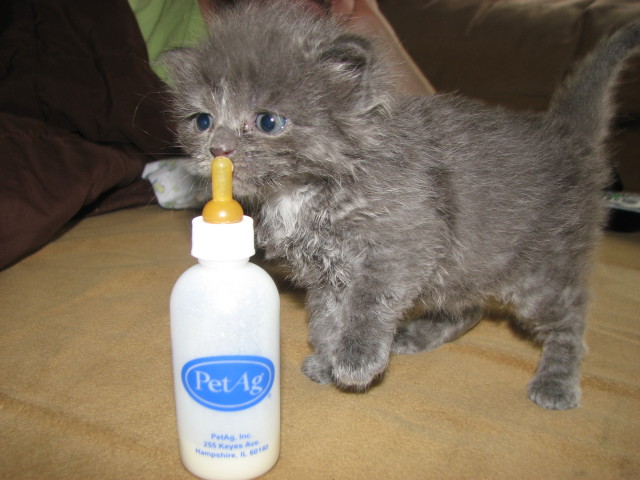QuestionQUESTION: How do I get a stray cat to stop spraying my front door and porch? Every day, the odor is renewed. This needs to stop. I have 2 spayed/neutered cats living in my home.
ANSWER: Robin,
I would recommend that you clean the area that's most commonly sprayed with an enzymatic cleaner which works by using beneficial bacteria (aka enzymes) to break down organic substances like urine, feces, blood, vomit, etc. I generally use a product called Petzyme which I purchase from the local Petsmart in the dog section. I generally purchase the gallon sized jug as it's cheaper on a per milliliter basis than the cat version of Petzyme and I'm sure it's the same product. I would also recommend that you consider deterring the stray cats with something offensive like dried habenero peppers or citrus peels. It may be worth taking pictures of these cats in the act and going door to door and asking people if these cats have a home. If nobody admits to being the guardian of these cats you may find that catching them in a humane live trap and asking a rescue organization that deals with stray and feral cats to neuter them may be the best solution. I would recommend that you research rescue organizations in your area and find one willing to neuter these cats prior to catching them in a humane live trap. Most cats will respond to canned salmon, tuna or sardines as bait in these traps. If you use a humane trap it's important to be there to bring the cats in out of the elements promptly once they've been caught because they can succumb to the elements quickly - I usually check my traps every half hour or so to prevent unnecessary suffering in the cats that I trap, neuter, vaccinate and release back into the area where they were found. Once neutered the testosterone levels will drop off gradually over a 2-3 week period and these guys should stop spraying. Having these guys neutered will help to reduce the number of female cats they breed with which will help to control the population of stray and feral cats in your area.
---------- FOLLOW-UP ----------
QUESTION: Thank you. We have since identified the owner of the cat, but we have not made the move to speak to them yet. My question now is, if we talk to them and they refuse to neuter the cat or otherwise do something about the problem, then what do we do? Can we then, legally, catch the cat and bring him to a shelter. Is Animal Control obligated to step in? Please remember that this cat is damaging our property, not only by spraying the front door and porch, but also by ripping our window screens as it tries (literally) to get inside out home. We quite literally can't open any windows because of this cat.
AnswerRobin,
I would like to start off by mentioning that I try my best to avoid becoming involved in neighbor disputes because inevitably someone will be unhappy with the outcome of a situation regardless of trying to keep things objective, polite and fair. The problem that you are having ultimately comes down to an issue of 'petiquette'. I would strongly recommend that you handle things as politely as possible and try to keep things as non-confrontational as possible. While you are obviously frustrated and angry with the neighbors and their cat's inappropriate behavior the cat's caregiver may not be aware of this problem and as they say, ignorance is bliss. If you charge into a discussion with the cat's people and essentially react to the ongoing issues with this cat, the property damage and the urine spraying things aren't likely to end up with anyone being happy and the issue will continue to be unresolved.
Take some photos or video of this cat that catch him in the act of spraying urine against your house and tearing your window screens. It's not a bad idea to take a photo of the cat on your property before he starts behaving badly. It's important to have proof that there is a problem before entering into a confrontation with a neighbor. You want to keep things polite, business like and respectful, if you don't you could end up feuding with your neighbors and that's a situation that nobody enjoys. It's quite possible that this kitty's guardians aren't aware of his behavior when he leaves the house. Providing concrete proof of the issue that you are trying to address with this cat's family members is important, some pet parents simply don't understand that there are things that their cats can do to offend neighbors if allowed to roam freely throughout the neighborhood without being spayed or neutered. Some people just don't realize that these offensive behaviors can be corrected by neutering their pet and ensuring that he's not outside when unsupervised. It's not unreasonable to be angry and frustrated with this kind of a situation, but keeping a cool head and approaching things calmly, politely and professionally can make all the difference when it comes to how the person on the receiving end will respond to your concerns.
I don't think that it's legal or okay to catch this cat and take him to a shelter despite the property damage he's responsible for. In the adult world there are appropriate ways to deal with situations like this and catching this cat could simply create an ugly neighbor dispute that never ends. I see no reason why you couldn't either write a polite, professional letter outlining the damage that this cat's done, include pictures of the problem and leave your name and address so that you and the cat's guardian can work things out appropriately. Sending this letter by registered mail to your neighbor and yourself ensures that the cat's human caregivers can't claim that s/he never received your letter or spoke to you about this problem. I see no harm in keeping things verbal initially, however if you feel as though you might fly off the handle because you're frustrated and angry about the ongoing spraying and property damage then there's no reason why communicating through writing isn't acceptable. I think speaking to the cat's caregivers about restitution for the property damage their cat is responsible for is perfectly acceptable provided that you do so in the appropriate manner. I never recommended catching an owned cat and turning him into a shelter simply because you are frustrated, when I mentioned trapping this cat as an option it was meant as an option if no guardian could be found. I don't think it's legal, ethical or appropriate to trap an owned cat and admit him to a shelter even if he is causing damage to your property.
Think about it this way - would you be angry if one of your cats was taken to the local shelter by an angry neighbor rather than addressing the issue and giving you a chance to remedy the situation? While I understand that you are angry and frustrated acting out of anger isn't the right answer, dealing with this issue head on is the first choice, in the event that this doesn't work or the neighbors simply refuse to take responsibility for their pet and the damages that he does when he's allowed to roam freely in the neighborhood then you can get the local by-law enforcement folks involved, update them on the history and share everything that's been done to try and correct the ongoing issue with this cat. It's actually not a bad idea to call animal control and ask them to fill out a complaint form that can be put on hold just so that there is official documentation when it comes to dealing with this issue. If animal control has a complaint from you in their logs and you've done everything you can to try and fix the problem without success then they have a reason to take things seriously and deal with them accordingly. Document everything, pictures that you have taken of this cat doing property damage and spraying urine onto your house will provide by-law enforcement officers with proof of what you've been dealing with. If you're going to speak with this cat's human family face to face it's not a bad idea to make sure that you always have a witness present so that someone else is able to tell the authorities what was said, what time you spoke to your neighbors and how the cat's caregiver received your concerns and complaints with regards to his/her cat's behavior. Communication could be the key to solving the issues you have with this cat and his guardians, especially if it's well thought out, non-confrontational, honest and polite. There's no harm in taking some time to do your research and find out what local by-laws apply to this situation and whether or not pets must be leashed and or supervised by their human guardians.
There are many reasons that pet parents opt not to spay or neuter their pets and not everyone understands the health and behavioral benefits of spaying/neutering their pet and the impact that this can have in terms of turning situations like this around. It may be helpful to compile a list of the health and behavioral benefits related to spaying and neutering cats and I've taken the liberty of listing some of the more common reasons choosing to sterilize a cat is a good idea. Intact male cats are more susceptible to cancers of the prostate, urinary tract and bladder. Unsterilized male cats can also develop malignant tumors of the testicles that are potentially fatal. Male cats that have been neutered fight less, wander less and their desire to spray urine to mark their territory diminishes substantially and sometimes disappears completely although this does take some time in a mature male cat because the testosterone levels take a few weeks to drop off completely. An obvious, but often overlooked benefit of spaying and neutering is population control. Male cats can breed with several female cats in a 24 hour period and father numerous kittens in the process. Just because the caregiver of the male cat doesn't have to deal with the pregnant queen and her litter of kittens doesn't mean that it's appropriate to allow the tom cat to breed indiscriminately throughout his lifetime. For some people not having their cat altered is a matter of not wanting to spend the money on this simple, relatively low risk surgery. Some men seem to look at castrating their male animal as being akin to castrating themselves. Sadly the fact remains that caring for a pet comes with lifelong responsibilities that include dealing with any property damage that a pet is responsible for.
It's crucial to be certain that the people you've seen caring for this cat are indeed his guardians. If the kitty in question doesn't belong in the household that you think he does then you will need to search for the cat's caregiver. In the event that this kitty's a stray you could try speaking with all of the neighbors in your area and asking them to help have this kitty neutered by contributing a small sum of money - I doubt very much that this cat singles your house out as the only place that he sprays or damages window screens so some neighbors will likely be quick to accept a reasonable end to the problem. If your neighbors aren't able or willing to contribute towards having this kitty neutered there are a number of charitable organizations that may be willing to help defray the cost of this cat's sterilization surgery. If this cat is a stray cat that the neighborhood has been caring for taking him to a no-kill shelter would be a far better option than admitting him to the average municipal shelter, the euthanasia rates for cats in shelters are incredibly high due to sheer numbers of unwanted felines and space constraints. If you are able to capture incidents of this cat spraying your house with urine or tearing your window screens in the form of pictures or video you could show this to the cat's human family. This will help to prove that there is indeed a problem with this cat's behavior in regards to his manners when he's out roaming unsupervised.
If the cat's caregivers don't respond to this issue you have other humane options. you can deter this cat and others from coming onto your property by using a few simple tools. For instance, if you live in a warm climate (which I'm assuming you do since you mentioned not being able to open windows and it's February) you could invest in some motion activated sprinklers which you could adjust the sensitivity of so that they would only be activated by cats or similar sized animals. Most cats prefer not to get wet and being sprayed by several sprinkler heads may just make this kitty stop coming onto your property. Another idea is to add upside down heavy plastic runners to the areas that this cat frequently urinates or damages. Placed upside down the plastic runners usually have small pointy parts where they're meant to dig into carpet so they can stay in place. Cats generally have fairly sensitive paws and he may not appreciate feeling sharp edges on his pads. Citrus peels are generally offensive to a cat's sensitive sense of smell so you could try spreading them around your front door and window ledges, they just might deter this kitty from continuing to make your home a regular stop during the daily rounds of his territory. In the event that you catch this kitty in the act and you live in a warm climate there's nothing wrong with spraying the cat with a strong spray from the garden hose, however this isn't a suitable way to deal with the issue if you live in a cold climate during the winter.
If your neighbors are completely unreasonable or in denial about the whole problem do be sure to mention that you don't want to have to involve the authorities, but if the problem persists you will be forced to contact animal control. Sadly there really isn't much in the way of laws requiring pet parents to spay or neuter their pets, in fact I suspect that the only way to legally address this problem would be to gather evidence that this specific cat is doing the damage and spraying your home with urine. Finding out for sure whose cat he is will also help.
Many areas require cats to be licensed, if your neighbor's cat isn't licensed it's quite possible that the local by-law officers can fine the cat's caregivers and require them to license their cat. By gathering photographic and video evidence that this particular cat is the one doing the property damage you can provide irrefutable proof if it comes down to a matter needing to be settled in a civil court. Find out what the local area's regulations are regarding free roaming outdoor cats and how much responsibility their pet parents have when it comes to any damage their pets might do when they aren't being directly supervised. The best way to pursue this in terms of legalities in my opinion is to take some time, write down a few points in terms of the way that this cat's actions and the caregiver's lack of awareness, responsibility, etc are affecting your household and try coming up with polite, non threatening ways of saying what needs to be said. If you go over and blow your top you aren't likely to accomplish anything.
As an uninvolved objective party I felt that I should include a general idea of what I mean by keeping things honest but neutral.
- The cat is spraying urine onto your front porch.
- The cat is damaging window screens on a regular basis.
- Find out if your municipality has leash laws that may apply to this cat and prevent him from roaming freely without supervision, if not there may be a clause stating that pet parents must have their pets under complete control at all time, this may help by giving you a legal basis for your complaints if you need to take this problem to the authorities.
- Find out what your legal options are and whether there are any legal responsibilities that this pet parent has when it comes to the above mentioned issues.
- Politely educate the pet parents about the health and behavioral benefits of neutering their cat.
- You could consult a lawyer to help you deal with this issue in civil court if all attempts to deal with it rationally on a casual basis fail.

 bottle feeding orphan kitten.
QuestionQUESTION: I rescued my kitten when he was 2 wee
bottle feeding orphan kitten.
QuestionQUESTION: I rescued my kitten when he was 2 wee
 my kitty Valentine
QuestionQUESTION: my kitten is 3 month old I only had h
my kitty Valentine
QuestionQUESTION: my kitten is 3 month old I only had h
 brother and sister loss of cat (16 years)
Question
Jesse on Xmas 2009, Re
kate -
my name
brother and sister loss of cat (16 years)
Question
Jesse on Xmas 2009, Re
kate -
my name
 Short Tailed Manx Kitten
Question
Una Mica Una Mica
Hello,
I go
Short Tailed Manx Kitten
Question
Una Mica Una Mica
Hello,
I go
 can you identify the breed of my cat?
Question
charlie
Ive been guessing Norwegian Forest Cat
can you identify the breed of my cat?
Question
charlie
Ive been guessing Norwegian Forest Cat